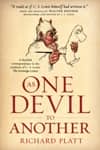
Gayle Trotter: When did you first read C.S. Lewis’s book The Screwtape Letters?
Richard Platt: I was introduced to Lewis about 20 years ago. The first of his books that I read was Surprised by Joy. I was introduced to it by a friend. I was reading books in that day just for their stylistic excellence, and I came back the next week and said, “Hey, this Lewis guy he is amazing. What else has he written?” After that I read The Case for Christianity, and then I read Mere Christianity, Screwtape, The Problem of Pain and everything else. I have been reading Lewis ever since, and every time I put down one of his books I wonder why I pick up anything else.
GT: Why did you decide to write a book in the style of The Screwtape Letters?
RP: Actually, I did not choose it, it chose me. I wrote this book in October and November of 2009. It began one night after dinner with my mind wandering. I started to wonder what a modern Screwtape would sound like, and I was thinking that there were many things in this world in need of Screwtapian treatment. So topics presented themselves, and I actually started hearing a narrative voice. I heard it in my head and I thought, ‘That is exactly what a modern Screwtape would sound like.’ So I just kept hearing this voice in my head all night, all the next day and I had two sleepless nights. There came a point when I realized that it was not something that I was making up, but it was something I was actually hearing. I decided to sit down and write it and then the floodgates opened. I wrote every day for 35 days and it was finished.
GT: Is it easy or hard to crawl inside the mind of the devil and write as he would?
RP: It was very easy for me. We will not speculate about why that is, but I would say that part of the reason is to be found in Lewis’s book on John Milton, A Preface to Paradise Lost. Lewis points out that in order to create an evil character, you only need to take the brakes off. You need to take all those little demons that run around inside your head, those little bits of spite, anger and envy and just release them. It is like letting a car roll downhill, and it just goes faster and faster. Whereas to portray good characters, you almost have to rise above your own level. That is why Lewis says, in Preface To Paradise Lost, that in Paradise Lost, Satan is incomparably the best drawn character. So I think being fallen creatures ourselves, understanding and portraying a fallen creature is easier than portraying a redeemed creature.
GT: Which temptation in The Screwtape Letters do you struggle with the most?
RP: That is not nice. [Laughter] I am not sure if it is the one I struggle the most with, but the one that I am most aware of is pride, I think. Because I think that is the one that sneaks up on us the most. I wrote with great glee. I enjoyed myself enormously, and Lewis said that, when he wrote Screwtape, he had never written with greater ease or with less pleasure. So of course what that says about me is a matter of speculation. But I was trying consciously each day. I felt that it was flowing really well and I was happy with the result. I was trying each day to remind myself that everything good that comes to us in our lives comes to us as a gift. I remind myself, “This book was given to you. It is not yours and you have been given a job to do. Your job was to get it down on paper and then to get it out in the world, but remember each day that the greatest thing you can be is a servant. All the good things that come to you in your life come to you as a gift and that you were never the source of anything that you do. You are only the instrument.”
GT: What would you say to critics who might say that your book reflects the losing side of the culture war?
RP: I would say that we are living in an age that is increasingly spiritually blind and morally deaf. The man who does not shout is not going to be heard. Christians in general are fighting a defensive action. The Christian apologist has become someone who is virtually expected to apologize for being a Christian and that has to stop. But I think it is a dangerous world and it is becoming increasingly more dangerous. Our voices need to be raised in unison against the deterioration of our culture.
GT: Who do you hope will read your book and what do you want them to take away from it?
RP: I would find it most gratifying if my book sent people back to Lewis, because Lewis has changed my life. I regard him as incomparably the greatest man of letters of the 20th century. I would consider my book a success if it caused one person to read Lewis, and as a consequence of that, their lives were changed. I can honestly say that it is from Lewis that I have learned almost everything I know about almost everything that matters and I would like to bring that experience to other people.
 As One Devil to Another: A Fiendish Correspondence in the Tradition of C. S. Lewis' The Screwtape Letters
As One Devil to Another: A Fiendish Correspondence in the Tradition of C. S. Lewis' The Screwtape Letters
